 Petzlover
Petzlover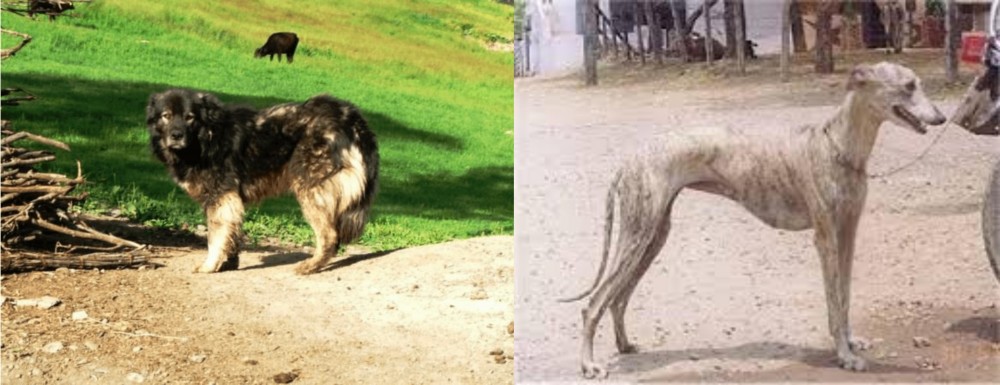 Kars Dog is originated from Turkey but Rampur Greyhound is originated from India. Kars Dog may grow 15 cm / 6 inches higher than Rampur Greyhound. Kars Dog may weigh 50 kg / 111 pounds more than Rampur Greyhound. Both Kars Dog and Rampur Greyhound has almost same life span. Both Kars Dog and Rampur Greyhound has almost same litter size. Kars Dog requires Moderate Maintenance. But Rampur Greyhound requires Low Maintenance
Kars Dog is originated from Turkey but Rampur Greyhound is originated from India. Kars Dog may grow 15 cm / 6 inches higher than Rampur Greyhound. Kars Dog may weigh 50 kg / 111 pounds more than Rampur Greyhound. Both Kars Dog and Rampur Greyhound has almost same life span. Both Kars Dog and Rampur Greyhound has almost same litter size. Kars Dog requires Moderate Maintenance. But Rampur Greyhound requires Low Maintenance
 The Kars Dog is found in Turkey, hailing more specifically from the Kars province, after which it is named. He actually has a long history of at least 600 years.
The Kars Dog is found in Turkey, hailing more specifically from the Kars province, after which it is named. He actually has a long history of at least 600 years.
Referred to as a Molosser, the dog is still used to this day for shepherding livestock. There are many varieties and sizes of the dog, with the most common Kars type being similar to the Nagazi variant of the Caucasian Shepherd Dog.
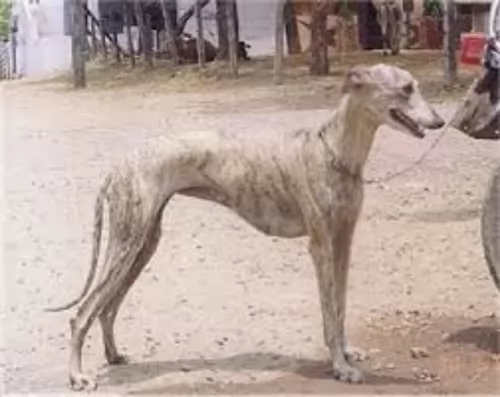 Known also as the North-Indian Greyhound or the Rampur Hound, the Rampur Greyhound is native to the Rampur area of Northern India.
Known also as the North-Indian Greyhound or the Rampur Hound, the Rampur Greyhound is native to the Rampur area of Northern India.
This dog is a member of the sighthound family, and in the past has been sought after for its efforts in controlling jackals.
The dog is also able to cover large distances at high speed. Some commemorative postage stamps were issued in 2005 as acknowledgement of this attractive dog breed.
 Large and heavy, the Kars Dog is strong, with a large head and broad chest. The height of the dog at the withers is 60 to 90cm and he weighs in at roughly 60 - 80kg.
Large and heavy, the Kars Dog is strong, with a large head and broad chest. The height of the dog at the withers is 60 to 90cm and he weighs in at roughly 60 - 80kg.
At one time the ears were cropped but they are left these days and then they are of medium length and floppy. The coat varies too in terms of length and color - short to longer variety coats. The coat can be a solid color or it can have patterns. You’ll find reddish brown dogs, grey and black dogs as well as dogs with a mix of colors.
The Kars is an aggressive, territorial dog, but with the correct training, socialization and upbringing, it can be a loving, amicable family pet.
Known also as the Kars Turkish Shepherd or Kars shepherd, he makes an ideal guarding dog as he is brave and devoted to those he is protecting. He is cautious and even unfriendly towards people he doesn’t know, and it is thought that because of his robustness, it might not be a good idea to leave him unsupervised with small children.
Nonetheless with training and socialization, the Kars is capable of being a super pet for all members of the family. Training him won’t be that easy as he is large and strong-willed, but the training will provide him with some basic good manners.
He will require a firm, confident owner and will require living in a home with a big garden or in the countryside as he requires a good amount of exercise.
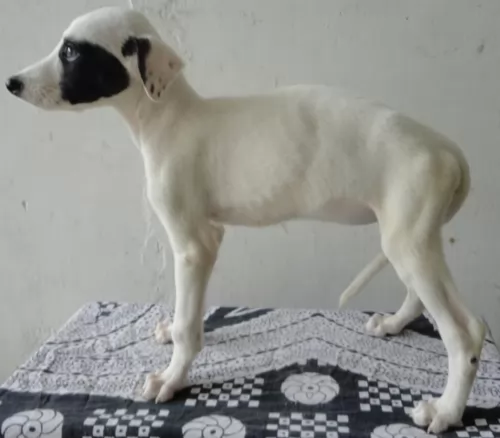 In height, the Rampur Greyhound stands at between 55 and 75 cm and they weigh in the region of 27 to 30kg.
In height, the Rampur Greyhound stands at between 55 and 75 cm and they weigh in the region of 27 to 30kg.
They are much the same as other greyhounds, but they’re somewhat wider and just a little bit more muscular. The head too, is broader than the slimmer head of the English Greyhound. Of course these dogs are known for the slim, pointed nose, the high-set ears which are sometimes half-floppy, half-erect. The eyes are large and the tail is long and slim.
The coat is short and smooth and is in colors such as gray, fawn, some white, some black with white and some brindle.
Your Rampur Greyhound is social around his human family, lapping up all their attention. He is the kind of dog that can be seen sprinting at high speed over the fields, but he is also not averse to lying peacefully with you on the sofa.
He is far better suited to a home with large gardens or on a farm as opposed to being confined to a small property in the city.
He can be gentle but when required, he becomes an excellent watchdog. He will need training and socialization as he can be rambunctious indoors, knocking things over. Training makes him obedient and restrained They get on well with children and other pets in the home.
 The Kars is a large dog and because of his past where he used to guard livestock, he is a dog used to wide open spaces. He will require a home with a good sized garden and a family who exercises him frequently.
The Kars is a large dog and because of his past where he used to guard livestock, he is a dog used to wide open spaces. He will require a home with a good sized garden and a family who exercises him frequently.
With the right kind of care, the Kars is able to strongly bond with his human family, taking his role as guardian and protector very well. He is alert and smart and that is why he will need training and socialization and a firm, fair human owner. He will then become a loving, devoted companion.
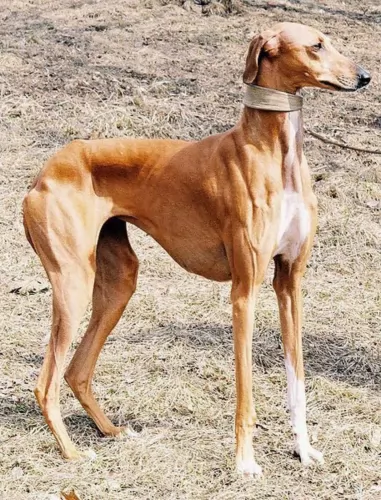 Everyone loves the Rampur Greyhound, and why not? He is fantastic with children because of his gentle, loving nature. He is a playful dog too and will require a daily dose of exercise.
Everyone loves the Rampur Greyhound, and why not? He is fantastic with children because of his gentle, loving nature. He is a playful dog too and will require a daily dose of exercise.
They aren’t noisy dogs, being naturally timid, but he still loves to get out and about with his daily walk to see and experience new sights and smells.
When you bring a Rampur Greyhound into your home, you’re bringing in a whole lot of wonderful companionship, love and loyalty from this remarkable canine.
 The Kars is generally healthy and long-lived, being able to reach 12 years of age with ease if cared for properly. Every dog, even the most healthiest ones, will have some health issues, and with a large dog like this, it is hip dysplasia, obesity, cancer and heart problems.
The Kars is generally healthy and long-lived, being able to reach 12 years of age with ease if cared for properly. Every dog, even the most healthiest ones, will have some health issues, and with a large dog like this, it is hip dysplasia, obesity, cancer and heart problems.
Coughing is a symptom of different illnesses, with one of them being heart disease. If your dog is still coughing after several days, its time to see the vet.
When your dog hasn’t exercised, you’ll see him battling to breathe or the breathing will be rapid. He’ll be reluctant to walk and play too and may be disinterested in his food. Edema, the swelling of body tissues is also a sign of heart disease.
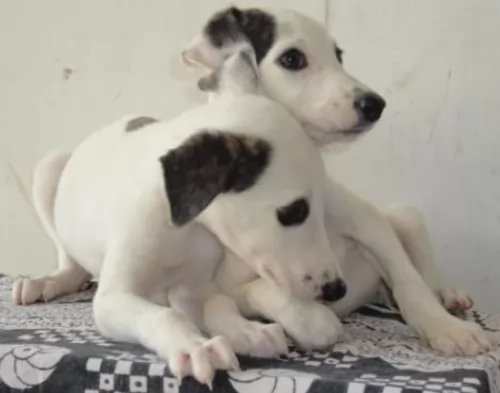 Rampur Hounds are generally a healthy dog breed, and their health is enhanced when you take good care of them and provide them with lots of love, good food and exercise.
Rampur Hounds are generally a healthy dog breed, and their health is enhanced when you take good care of them and provide them with lots of love, good food and exercise.
Still, every dog can fall prey to any one of the many dog illnesses there are such as cancer, bloat, diabetes, ear infections, epilepsy, obesity, eye problems and others.
This can be deadly for your dog. Gas collects in the stomach and the stomach can twist. You’ll notice your dog has a hard, swollen stomach and he is lethargic, but restless. Getting him to the vet as quickly as possible should be a top priority.
Your pet can develop all kinds of skin problems where he bites and scratches, causing bacteria. It can be terribly painful for your pet, and even ticks and fleas on the skin can cause cause a lot of irritation for your pet.
Some people add in omega 3 oils to their pet’s diet to help with dry skin. Don’t let your pet suffer with skin allergies and other problems that are itchy and painful. Get him to the vet so you can get to the root of what is causing him so much frustration with his skin.
 Your Kars dog can be a wonderful addition to your home, but you need to know how to care for a big dog before you get carried away and add a large puppy breed to your family.
Your Kars dog can be a wonderful addition to your home, but you need to know how to care for a big dog before you get carried away and add a large puppy breed to your family.
Too many people buy a cute bundle of fur and get rid of it when he is no longer a cute puppy. Before you bring a giant breed dog into your home, take note of some useful tips to keep him in tip top condition -
If you bring a puppy home, he’ll need to be fed 4 times a day with special puppy food. There are excellent commercially manufactured puppy foods on the market and you will need to get the one that caters for ‘large- or giant puppy breeds’, as the Kars is a very big dog.
As your dog reaches adulthood you’ll feed him less. If in any doubt as to the kind of food to give your dog to maintain good health, speak to your vet.
Every dog will need exercise to keep him trim and fit but to also stimulate their minds. Providing your Kars dog with exercise such as walks and ball games will also ensure he doesn’t become bored.
Your pet will need a nice quiet, warm, dry place to sleep and rest. If he is an outdoor dog during the day, make sure that he has a place to rest in the shade. Make sure he has a non-stop supply of fresh, cool water too that is placed in a cool, reachable spot.
Your large pet is an average shedder and to keep his thick coat in tip top condition, you want to be sure to brush him at least twice a week.
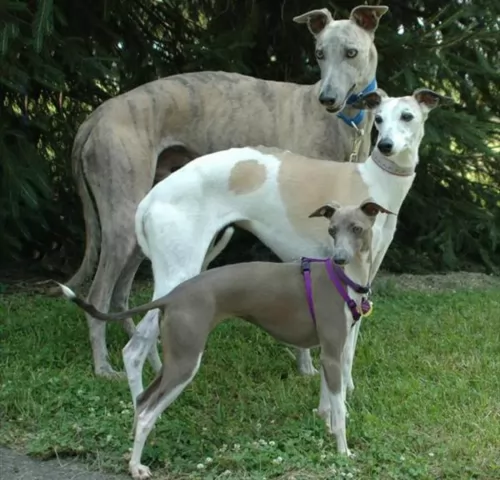 Active and playful, your Rampur Hound will need a lot of space to let off steam and run. He will look forward to his walks every day with you. Maybe you’ll need a tennis racquet to hit the ball far enough for him to sprint after.
Active and playful, your Rampur Hound will need a lot of space to let off steam and run. He will look forward to his walks every day with you. Maybe you’ll need a tennis racquet to hit the ball far enough for him to sprint after.
These dogs, with their short coats, are considered to be low maintenance, even though they do shed.
A good brush twice a week will do them good and they just love being massaged. It’s your time to run your hands over the slim, muscled body to make sure there are no unusual lumps on him.
Follow a regular grooming regime when you brush him. Check inside his ears, have a look at his eyes to make sure they’re still bright. Check inside his mouth for bad teeth which could be causing him terrible pain and make sure to trim his nails.
To be healthy and content, every dog needs good food.For convenience it can be great to feed your Greyhound one of the high quality commercially manufactured dog foods. To vary the food occasionally, add in some delicious home-made food too.
Once or twice a week you can simply add some home-made food to the dry kibble. Boiled chicken, brown rice or pasta and spinach, sweet potatoes and carrots are a healthy choice for your pet. Nothing complicated.
If you cook it in bulk, you can chop it all up and feed smaller portions to your pet. Some raw meat added in from time to time will also keep him healthy.
A simple meal like this will please your dog no end. No exotic spices and strange, weird kinds of food which could upset his stomach – just plain and simple the way dogs love it.
Ensure there is always a bowl of fresh, cool water within his reach.